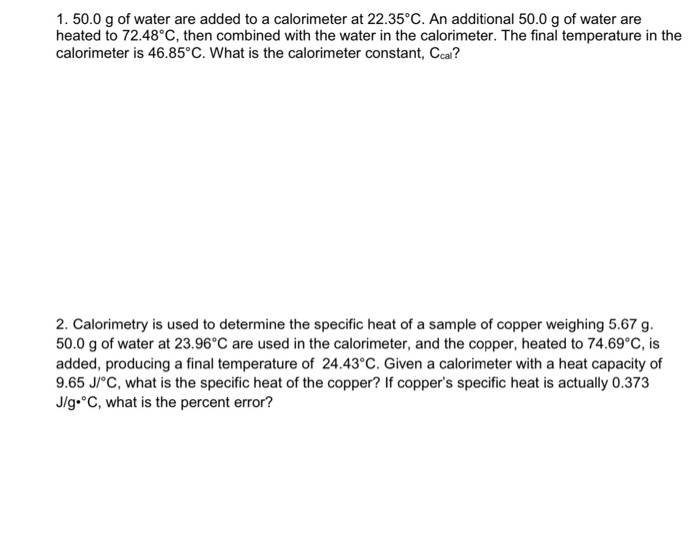1. 50.0 g of water are added to a calorimeter at 22.35°C. An additional 50.0 g of water are heated to 72.48°c, then combined with the water in the calorimeter. The final temperature in the calorimeter is 46.85°C. What is the calorimeter constant, Ccal? 2. Calorimetry is used to determine the specific heat of a sample of copper weighing 5.67 g. 50.0 g of water at 23.96°C are used in the calorimeter, and the copper, heated to 74.69°C, is added, producing a final temperature of 24.43°C. Given a calorimeter with a heat capacity of 9.65 J/°C, what is the specific heat of the copper? If copper's specific heat is actually 0.373 J/g•°C, what is the percent error?
1. 50.0 g of water are added to a calorimeter at 22.35°C. An additional 50.0 g of water are heated to 72.48°c, then combined with the water in the calorimeter. The final temperature in the calorimeter is 46.85°C. What is the calorimeter constant, Ccal? 2. Calorimetry is used to determine the specific heat of a sample of copper weighing 5.67 g. 50.0 g of water at 23.96°C are used in the calorimeter, and the copper, heated to 74.69°C, is added, producing a final temperature of 24.43°C. Given a calorimeter with a heat capacity of 9.65 J/°C, what is the specific heat of the copper? If copper's specific heat is actually 0.373 J/g•°C, what is the percent error?
Chemistry
10th Edition
ISBN:9781305957404
Author:Steven S. Zumdahl, Susan A. Zumdahl, Donald J. DeCoste
Publisher:Steven S. Zumdahl, Susan A. Zumdahl, Donald J. DeCoste
Chapter6: Thermochemistry
Section: Chapter Questions
Problem 112AE: In a bomb calorimeter, the reaction vessel is surrounded by water that must be added for each...
Related questions
Question

Transcribed Image Text:1. 50.0 g of water are added to a calorimeter at 22.35°C. An additional 50.0 g of water are
heated to 72.48°c, then combined with the water in the calorimeter. The final temperature in the
calorimeter is 46.85°C. What is the calorimeter constant, Ccal?
2. Calorimetry is used to determine the specific heat of a sample of copper weighing 5.67 g.
50.0 g of water at 23.96°C are used in the calorimeter, and the copper, heated to 74.69°C, is
added, producing a final temperature of 24.43°C. Given a calorimeter with a heat capacity of
9.65 J/°C, what is the specific heat of the copper? If copper's specific heat is actually 0.373
J/g•°C, what is the percent error?
Expert Solution
This question has been solved!
Explore an expertly crafted, step-by-step solution for a thorough understanding of key concepts.
This is a popular solution!
Trending now
This is a popular solution!
Step by step
Solved in 9 steps with 13 images

Knowledge Booster
Learn more about
Need a deep-dive on the concept behind this application? Look no further. Learn more about this topic, chemistry and related others by exploring similar questions and additional content below.Recommended textbooks for you

Chemistry
Chemistry
ISBN:
9781305957404
Author:
Steven S. Zumdahl, Susan A. Zumdahl, Donald J. DeCoste
Publisher:
Cengage Learning


Chemistry: An Atoms First Approach
Chemistry
ISBN:
9781305079243
Author:
Steven S. Zumdahl, Susan A. Zumdahl
Publisher:
Cengage Learning

Chemistry
Chemistry
ISBN:
9781305957404
Author:
Steven S. Zumdahl, Susan A. Zumdahl, Donald J. DeCoste
Publisher:
Cengage Learning


Chemistry: An Atoms First Approach
Chemistry
ISBN:
9781305079243
Author:
Steven S. Zumdahl, Susan A. Zumdahl
Publisher:
Cengage Learning

Chemistry: The Molecular Science
Chemistry
ISBN:
9781285199047
Author:
John W. Moore, Conrad L. Stanitski
Publisher:
Cengage Learning

Chemistry & Chemical Reactivity
Chemistry
ISBN:
9781337399074
Author:
John C. Kotz, Paul M. Treichel, John Townsend, David Treichel
Publisher:
Cengage Learning

Chemistry: Principles and Reactions
Chemistry
ISBN:
9781305079373
Author:
William L. Masterton, Cecile N. Hurley
Publisher:
Cengage Learning